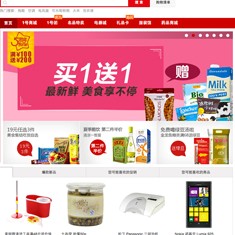 Yihaodian.com (its name translates as “number one shop”) — China’s leading online grocer — and the Shanghai Fishery General Corp Group (SFGCG) held a ceremony recently to celebrate its deal to sell seafood in China’s largest cities.
Yihaodian.com (its name translates as “number one shop”) — China’s leading online grocer — and the Shanghai Fishery General Corp Group (SFGCG) held a ceremony recently to celebrate its deal to sell seafood in China’s largest cities.Tang Qijing, chairman of SFGCG, explained that fish sourced by his company from Asia, Latin America and Africa will all be sold on Yihaodian, which is majority-owned by WalMart. Tang also said that the firm’s online prices would be “good value” and cited Norwegian salmon and Alaska cod selling at rates comparable to those charged by supermarkets.
Hailing the venture as a “groundbreaking” step forward for China's seafood market, at the ceremony Wu Haiquan, Yihaodian VP said Yihaodian will focus on Beijing, Shanghai, Guangzhou and other cities on the East coast. While China has embraced online retailing, China’s patchy logistics networks have proven a major challenge for Internet vendors, particularly in smaller cities.
Wu said quality is also an issue that online business should pay attention to. He’ll be hoping to avoid the failure of other online food retailers in China — among them Ban Bian Tian, the online arm of Yonghui Superstores Co Ltd, the Fuzhou-based supermarket chain. It closed recently after only two months in operation having failed to expand sales and build a reliable distribution network.
While individual fish farms and domestic vendors have used the ebay-like Taobao to sell seafood products in China, major online retailing operations have struggled to find a profitable model. Yihaodian has yet to turn a profit but its reach and popularity allows WalMart (which has a 52 percent stake) an edge over competitors like Carrefour and Tesco. Retail experts expect both to enter the fray.
A report from McKinsey & Company shows how much China has embraced online retail — it commanded about 5 to 6 percent of total retail sales in 2012, compared with 5 percent in the U.S. However, Chinese customers tend to buy through intermediary sites like Yihaodian rather than directly from retailers.
With China’s economy expected to increasingly turn to consumption-driven growth, seafood companies here have been hiring big names to reach out to local consumers. SFGCG is clearly in expansion mode. The company’s top executives recently flew to the Shandong South Seas Shipbuilding Corp to celebrate the launch of two new vessels: a 67 meter squid boat and a 44.9 meter longline tuna fishing vessel. Meanwhile the company CEO and director of strategy flew to Mauritania to meet the country’s fisheries ministry.
Shrimp specialist and processor Zhanjiang Guolian Aquatic Products Co hired Taiwanese singer named Zhou Huajian (also known as Wakin Chou) to be its celebrity endorser, plastering the megastar’s face over packaging of frozen seafood products sold through Chinese supermarkets. The firm also sells goods on Taobao.
Interestingly, McKinsey’s study is that online retailing in China is not just replacing traditional retail transactions but also stimulating consumption that would not otherwise take place. McKinsey found that USD 1 (EUR 0.77) of online consumption replaces roughly USD 0.60 (EUR 0.46) of sales in offline stores and generates around USD 0.40 (EUR 0.31) of incremental consumption. Based on a study of 266 cities accounting for 70 percent of online retail sales, McKinsey expects online sales could generate 4 percent to 7 percent in incremental consumption by 2020. This fits snugly with a government policy push to increase consumption’s share of China’s GDP (currently at 35 percent compared to an average 70 percent in Western economies) as infrastructure and real estate spending slows down.
SFGCG will be hoping it can get in on the act early. With CNY 3.2 billion (USD 520 million, EUR 400 million) in revenues and USD 62 million (USD 10 million, EUR 7.8 million) international trade, the SFGCG group claims it focuses on deep-sea fishing and has 100 assorted vessels currently, including large factory trawlers and tuna longliners, with a total annual catch of over 160,000 metric tons. The group has 18 joint ventures or representative offices in 12 countries. The firm also helped build the Shanghai Oriental International Fisheries Centre Market a 110,000 square meter seafood trading market in Shanghai.





